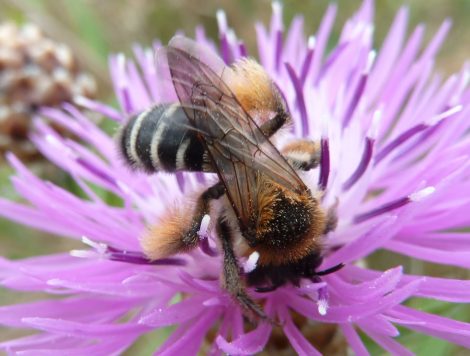To mark World Bee Day on May 20, Guillaume Lemoine, ECT’s biodiversity officer, highlighted the importance of preserving all bee species, which are essential pollinators for the balance of ecosystems.
Protecting bees isn’t just a case of installing beehives for honey production on the roof of an office building in a town center. These hives are usually home to “Italian” or “Buckfast” hybrid bees. And there’s more than simply setting up an insect hotel in the middle of a neatly-mown green.
There are over 960 species of bee in France, and 80% of them nest in the ground
As we know, bees play a vital role in the reproduction of entomophilous flowering plants. They also help produce fruit and vegetables. Above all, together with other pollinators such as hoverflies and butterflies, they enable wild plants to reproduce, which in turn enables wild flora to survive. But they also allow them to cross-fertilize their genes and adapt to changing living conditions and environments. In short, to evolve.
Protecting and promoting bees only makes sense if all bee species are included: bumblebees, halictids and Megachile, Anthidium, Osmia and Andrena bees. In particular, we need to include specialist species that pollinate only a limited range of plants.
Multiplying grassroots initiatives
Together, we need to work to restore their natural habitats and change our management methods. We need to create suitable breeding environments and strengthen their food resources.
This is why, as part of the urban forest project on the Van Pelt site (Lens – 62) carried out by ECT in partnership with EPF Hauts-de-France, the racks of a former waste disposal site are being recycled and filled with sand of different grain sizes. These racks will help ground-nesting and sand bees to reproduce. Nearby dry meadows are also being restored (export mowing).
In the same spirit, ECT virtually systematically installs woodland, orchards, hedgerows and rural forest edges. We also sow flower meadows and ground cover with clover, sainfoin, birdsfoot trefoil, etc. when we carry out our projects.

